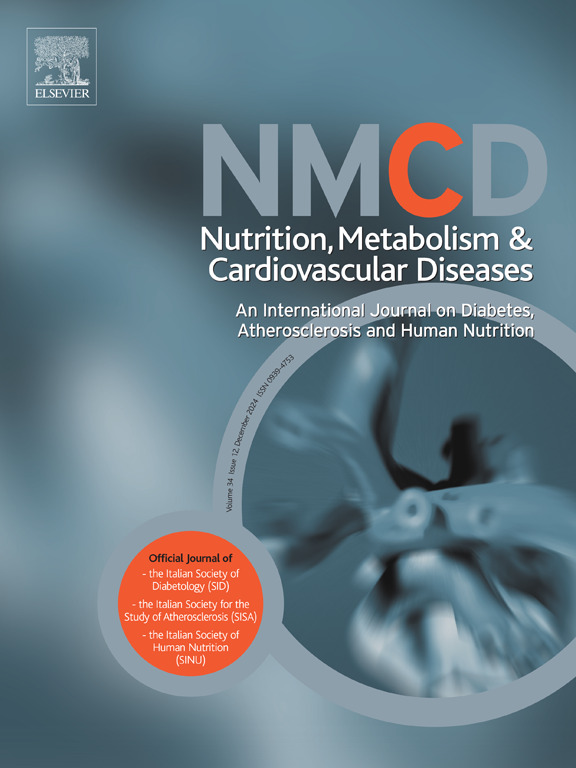热量限制疗法对心力衰竭患者健康相关结果的影响,系统回顾和荟萃分析。
IF 3.3
3区 医学
Q2 CARDIAC & CARDIOVASCULAR SYSTEMS
Nutrition Metabolism and Cardiovascular Diseases
Pub Date : 2025-01-01
DOI:10.1016/j.numecd.2024.09.026
引用次数: 0
摘要
目的:我们进行了这项系统性综述,以全面评估CRT对高血压患者健康相关结果的影响:为了找到调查 CRT 对高血压患者健康相关结果影响的研究,我们对 PubMed、Cochrane Library、Embase 和 Cumulative Index to Nursing and Allied Health Literature 数据库进行了系统性检索(起始时间至 2023 年 2 月 12 日)。共有 10 项研究(包括 933 人)符合纳入标准。系统综述显示,8 到 24 周的 CRT 干预为高血压患者带来了一些健康益处。CRT明显降低了患者的体重(SMD = - 0.52,95 % CI = - 0.99 至 -0.04,P = 0.03,I2 = 77 %),改善了患者的生活质量(SMD = 0.35,95 % CI = 0.12 至 0.58,P = 0.003,I2 = 0 %)。然而,CRT明显增加了死亡率和心房颤动相关再住院的风险,包括一年内全因死亡和心房颤动相关再住院的合并事件(CRT组:20%对对照组:5%)、1.52年内的死亡率(CRT组:34%对对照组:22%)、再入院率(CRT组:52%对对照组:17%)和再入院后的住院时间(CRT组:124天对对照组:18天):结论:CRT 对心房颤动患者的健康相关结果无明显益处,因此大多数心房颤动患者可能不适合接受 CRT 治疗。同时,综述中的研究还存在一些方法学问题,因此证据质量为中低水平:本综述的 PROSPERO 注册号为 CRD 42023413992。本文章由计算机程序翻译,如有差异,请以英文原文为准。

Effects of calorie restriction therapy on health-related outcomes in patients with heart failure, a systematic review and meta-analysis
Aims
We conducted this systematic review to comprehensively assess the impact of CRT on health-related outcomes among patients with HF.
Data synthesis
In order to find studies investigating the effect of CRT on health-related outcomes among patients with HF, we performed a systematic search of PubMed, Cochrane Library, Embase, and Cumulative Index to Nursing and Allied Health Literature databases (inception until February 12th, 2023). A total of 10 studies including 933 individuals met the inclusion criteria. The systematic review indicated that 8 to 24 weeks of CRT intervention offered some health advantages for patients with HF. CRT significantly reduced patients’ body weight (SMD = - 0.52, 95 % CI = − 0.99 to −0.04, P = 0.03, I2 = 77 %) and improved their quality of life (SMD = 0.35, 95 % CI = 0.12 to 0.58, P = 0.003, I2 = 0 %). However, CRT significantly increased the risk of mortality and HF-related rehospitalization, including combined events of all-cause mortality and HF-related rehospitalization within a year (CRT group: 20 % vs. control group: 5 %), mortality rate within 1.52 years (CRT group: 34 % vs. control group: 22 %), readmission rate (CRT group: 52 % vs. control group: 17 %), and length of stay after readmission (CRT group: 124 days vs. control group:18 days).
Conclusion
CRT provides no significant benefits in terms of health-related outcomes among patients with HF, hence most patients with HF might not be eligible for CRT treatments. Meanwhile, there are several methodological issues among the studies included in the review, resulting in a low-to-moderate quality of evidence.
Registration
The PROSPERO registration number of this review is CRD 42023413992.
求助全文
通过发布文献求助,成功后即可免费获取论文全文。
去求助
来源期刊
CiteScore
6.80
自引率
2.60%
发文量
332
审稿时长
57 days
期刊介绍:
Nutrition, Metabolism & Cardiovascular Diseases is a forum designed to focus on the powerful interplay between nutritional and metabolic alterations, and cardiovascular disorders. It aims to be a highly qualified tool to help refine strategies against the nutrition-related epidemics of metabolic and cardiovascular diseases. By presenting original clinical and experimental findings, it introduces readers and authors into a rapidly developing area of clinical and preventive medicine, including also vascular biology. Of particular concern are the origins, the mechanisms and the means to prevent and control diabetes, atherosclerosis, hypertension, and other nutrition-related diseases.

 求助内容:
求助内容: 应助结果提醒方式:
应助结果提醒方式:


